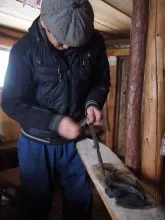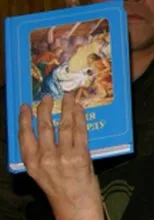
And this is exactly what another young linguist, Matt from the United States, attempted to do: first, to follow the reindeer; and second, to spend a winter in a hunting cabin, in order not only to start learning the language, but to experience the lifestyle. Here is what Matt shared about this: “The lives of Evenki reindeer herders are so far removed from anything that people in the U.S. or in Moscow have ever experienced. Their world has its own rules, knowledge, and hierarchy. It’s not like anything I’ve ever been a part of prior to this. I met a woman from Krasnoyarsk who now lives in California and told her about my own life in Krasnoyarsk and about traveling with the Evenki. I was explaining to her their traditional way of life and saying some still live in chums (tepees) and travel around with their reindeer herds. And she said, ‘No. There is nobody in Russia who lives in a chum.’ I responded, ‘But I myself have been with people who live in a chum.’ ‘No, this doesn’t exist anymore. Such things were a hundred years ago,’ she stubbornly insisted…”

The cabin was located in the vicinity of a town called Baykit on the bank of Podkamennaya Tunguska, a large branch of the Yenisei River. The average annual temperature is ‑6.3 degrees Celsius, and the minimal temperature in winter sometimes drops down to ‑56 degrees.
“No heat, no electricity,” Matt described their living conditions. “We were cutting down trees and chopping them up, and at night somebody had to get up once every three hours and put more wood into the fire. In Evenki culture it’s considered bad luck to let the fire go out, so they are very attentive to keeping it going all night long. And they are very good at it. When I was in charge of the fire, I often had to relight it, because I didn’t start it up again soon enough.” It’s not at all surprising that Matt, being a modern man, was not an expert in survival.
One of his two companions, let us call him Gennady, happened to be an atheist, and when Matt did something wrong, he always complained, “Your prayers don’t work.” Whenever he saw Matt reading his English Bible, he would say, “You are wasting your time on your prayers again” and would make fun of him. The life of these three men with very different worldviews isolated from society in a cabin in the harsh conditions of a forest in the Siberian winter seems had the potential to become very confrontational (though Matt recalls it very fondly):
“The owner of the land on which the cabin stood, Georgy (name changed), is an Orthodox Christian and kept a beautiful Russian-language copy of the Gospels with an icon of Christ on the front. Typically, the icon stood on top of a doily and leaned against the wall, the only decorative element in an otherwise primitive cabin. When I arrived at the cabin with Georgy, the Bible had been laid on the table face down. He asked Gennady, “Why is my Lord and Savior face down? He should be standing up, where we can see Him.” Gennady murmured a response and busied himself with something else. Some days later Georgy left again for a remote job. Gennady and I were repairing skis on the table. He motioned to the Bible. “Get rid of that.” He said it so harshly I suspected something more than inconvenience. “You don't like the Bible?” I asked. “No.” “Why not?” He thought for a time and said, “I get it. I'm a sinner.” I put the Bible on the shelf, but that wasn’t enough. A few minutes later he threw down the ski, took the Bible and buried it under a stack of old newspapers in the far corner, where he wouldn't even see the spine of the offending book.”

“I brought it out, expecting a bad reaction, because the Evenki word for Bible is Biblia, which is very recognizable from Russian. And so I thought I would get the same very negative reaction, but he opened it up and started reading the story of creation. And he read the first few words in Evenki and looked at me with a big smile and said, “Wow! This is ours!” And we were reading it for an hour and a half, though tired and hungry after all our long time in the woods. We read page by page, and he was explaining the story to me, explaining what was going on. He often laughed with joy as we read together, working through passages and talking about word choices. We only quit because it was time to eat. Sitting and reading with Gennady for those few hours has been the highlight of my time in Russia. It drives home the point that there is value in Bible translation work, even for those whose language is dying, even for those who prefer Russian in nearly all domains (as Gennady seemed to), and even for those whose understanding of the material being read is imperfect.”
We would greatly appreciate your financial assistance towards this project.
If you prefer to send your donation through a forwarding agent in the U.S. or Europe,
please write to us and we'll provide the details of how this can be done.
IBT Russia/CIS is a non-profit organization financed through contributions from individuals, sponsoring organizations and foundations.
You can donate to IBT:
Through: AO UniCredit Bank, Moscow
SWIFT: IMBKRUMM
In favour of: Institute for Bible Translation
Address: 119334, Russia, Moscow, Andreevskaya nab. 2
TIN (INN) 7736231521
9-digit Bank identification code in Russian banking system: 044525545
Account no. (IBAN):
634261 USD 4020 02 001 or 40703840700010142881
634261 EUR 4020 02 001 or 40703978700010366720
634261 GBP 4020 02 001 or 40703826600010366723
Through: NOSTRO ACCOUNTS OF AO UNICREDIT BANK, MOSCOW:
USD JPMORGAN CHASE BANK N.A., NEW YORK SWIFT CODE: CHASUS33
EUR UNICREDIT BANK AG (HYPOVEREINSBANK) , MUNICH SWIFT CODE: HYVEDEMM
EUR UNICREDIT BANK AUSTRIA AG, VIENNA SWIFT CODE: BKAUATWW
EUR UNICREDIT S.P.A., MILANO SWIFT CODE: UNCRITMM
GBP THE ROYAL BANK OF SCOTLAND PLC, LONDON SWIFT CODE: RBOSGB2L
Important! In the field "designation" write "CHARITY DONATION"
For more information address IBT
You may sign up to receive our Russia/CIS monthly English newsletter here
